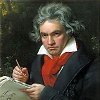Like music, [painting] acts on the soul through the intermediary of the senses, the harmonious tones corresponding to the harmonies of sounds, but in painting, a unity is obtained which is not possible in music, where the accords follow one another, and the judgement experiences a continuous fatigue if one wants to reunite the end and the beginning. In the main, the ear is an inferior sense to the eye. The hearing can only grasp a single sound at one time, whereas the sight takes in everything and at the same time simplifies at its will.
Notes Synthéthiques (ca. 1884-1885), ed. Henri Mahaut, in Vers et prose (July-September 1910), p. 52
![Like music, [painting] acts on the soul through the intermediary of the senses, the harmonious tones corresponding to the harmonies of sounds, but in ...](https://img.libquotes.com/pic-quotes/v1/paul-gauguin-quote-lbm0z3q.jpg)
![Like music, [painting] acts on the soul through the intermediary of the senses, the harmonious tones corresponding to the harmonies of sounds, but in ...](https://img.libquotes.com/pic-quotes/v2/paul-gauguin-quote-lbm0z3q.jpg)
![Like music, [painting] acts on the soul through the intermediary of the senses, the harmonious tones corresponding to the harmonies of sounds, but in ...](https://img.libquotes.com/pic-quotes/v3/paul-gauguin-quote-lbm0z3q.jpg)
![Like music, [painting] acts on the soul through the intermediary of the senses, the harmonious tones corresponding to the harmonies of sounds, but in ...](https://img.libquotes.com/pic-quotes/v4/paul-gauguin-quote-lbm0z3q.jpg)



















